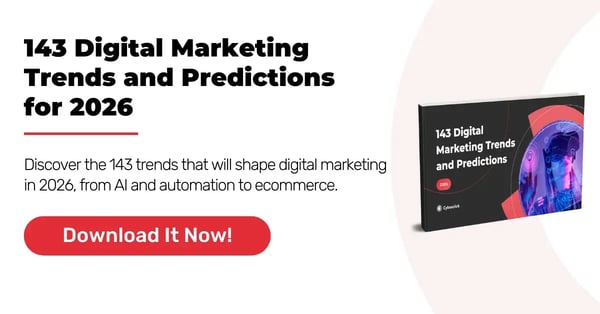With the rise of artificial intelligence, many CRM platforms have decided to integrate this technology into their systems. This allows them to offer clients improved data analysis, more accurate predictions, and a wider range of automation options. Additionally, they can include an AI-powered chat feature to guide and assist users as they navigate the platform, making the system more user-friendly.
Not all CRM tools have incorporated AI and those that have often implement them in different ways. In this article, we’ll explain why using a CRM with Artificial Intelligence for marketing, sales, and customer service is a good idea. We’ll also highlight the top CRM systems successfully using this technology.

What Is an AI CRM Tool and How Does It Work?
AI CRM tools are an evolution of traditional customer relationship management systems. These platforms are designed to optimize and centralize customer relationships while automating certain tasks. By incorporating AI, these tools gain advanced data analysis capabilities, enabling them to process larger amounts of information more effectively, identify patterns, and make predictions.
This gives businesses equipped with AI-driven CRM systems the ability to make smarter strategic decisions, among many other advantages that we’ll cover in the next section.
AI-powered CRM systems function using machine learning algorithms and natural language processing. Among their many capabilities is the ability to generate real-time insights, providing businesses with actionable data when they need it most.
Advantages of Integrating AI into Your CRM Tools
-
Time-Saving: By automating more tasks—more accurately and efficiently—teams can focus on strategic and creative initiatives.
-
Shortened Training Periods: AI-driven CRM tools often include a built-in chatbot to guide users, reducing the need for lengthy onboarding and training processes.
-
Simpler and More Intuitive Navigation: Thanks to AI assistance, these CRM software programs are often easier to use, with features that are quickly accessible.
-
Improved Decision-Making: With predictive analytics, AI CRM systems can anticipate customer needs and behaviors, leading to greater sales efficiency.
-
Hyper-Segmentation: AI can identify unique patterns and preferences, creating more specific customer groups for targeted campaigns.
Key Applications of AI in CRM Systems: From Personalization to Predictive Analytics
The two standout features of AI-powered CRM tools are personalization and predictive analytics. Personalization involves processing customer interactions with a brand and analyzing their behavior in real-time. This enables businesses to create more relevant messages, tailored offers, and precise recommendations, which improve customer satisfaction and loyalty rates.
Predictive analytics, on the other hand, allows brands to anticipate emerging trends and forecast customer behaviors. For example, brands can identify when a customer is ready to convert, when there’s a higher risk of customer churn, or the optimal time for upselling or cross-selling opportunities.
Both functionalities not only help businesses maximize revenue, but also allow them to optimize resources and prioritize their team’s efforts.
The Top 5 CRM Tools with the Best AI Implementation
HubSpot
HubSpot’s standout AI features include customer segmentation and automation, which enable you to personalize your marketing strategies and boost conversions.
Additionally, HubSpot offers an AI-powered blog idea generator to help inspire blog articles or social media content. Its Campaign Assistant takes this a step further by generating conversion-focused content, such as landing pages, ads, and email marketing copy.
Another innovative feature is its AI capability to transform text into video clips, which is especially helpful for smaller brands with limited budgets for producing multimedia content.
Finally, HubSpot has introduced Breeze, its AI-powered personal assistant. Breeze is designed to help users across all their projects, integrating many of the AI features mentioned above into an intuitive tool—and more.

Salesforce
Salesforce’s AI, known as Einstein 1, excels in data analysis, automating repetitive tasks, and performing contextual and predictive analytics. One of its most prominent features is personalized recommendations.
Salesforce is also highly regarded for its seamless integration with other tools, offering a smooth user experience. That being said, a notable limitation is the restriction on the types of data it can process.
Zoho CRM
Zoho’s AI, aptly named Zia, functions as a virtual assistant for the platform. Similar to HubSpot’s Breeze, Zia handles tasks such as contact management, email and document drafting, and customer data collection.
It’s particularly well-suited for e-commerce businesses, as it can integrate into websites to answer customer inquiries. Additionally, it offers product recommendations based on customer data.
Bitrix24
Bitrix24’s AI capabilities include client management, marketing automation, project management, and integrated communication tools. One of its strongest features is its ease of use and versatility, catering to businesses of all sizes.
Its AI leverages Microsoft’s CoPilot, which provides real-time predictions, data analysis, and personalized recommendations. This empowers teams to make better decisions with live insights.
Microsoft Dynamics 365
If your company operates within the Microsoft ecosystem, this is the CRM tool for you. Its AI excels in predictive analytics and improving customer experiences. Additionally, Microsoft Dynamics 365 offers a mobile version, enabling professionals to manage tasks more conveniently, no matter where they are.
Inbound Marketing Strategist en Cyberclick. Especializado en HubSpot, lidera las estrategias de inbound marketing de los clientes de Cyberclick. Oier es un apasionado del marketing, la creatividad y el audiovisual y es licenciado en Bellas Artes con un máster en Artes Digitales.
Inbound Marketing Strategist at Cyberclick. He leads inbound marketing strategies for Cyberclick's clients, with experience in CRM management and HubSpot. Oier is passionate about marketing, creativity and audiovisual content and he holds a degree in Fine Arts with a master's degree in Digital Arts.






Leave your comment and join the conversation